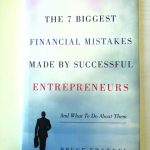In life and in business we are all bound to make mistakes. This book, The 7 Biggest Financial Mistakes Made by Successful Entrepreneurs, immediately caught my attention. The author is Bruce Frankel, a Certified Financial Planner who specializes in finance, marketing and operations. He has worked with companies of all sizes from family-owned to large corporations. Frankel addresses the simple truth that “this book isn’t for huge organizations with thousands of employees and hundreds of investors. This book is written for you, the hardworking, perseverant, passionate entrepreneur wanting to optimize your opportunities and avoid the common pitfalls that trip up many.” Frankel goes on to explain, “The art of careful planning involves an integrated design between your personal and your business arrangements. The risk of destroying the family’s lifestyle due to poor results or poor planning in the business weighs on most entrepreneurs’ hearts and minds.”
Reading this book was a real eye-opener. It caused me to re-evaluate the structure, and the whole concept, of financial planning, both personally and in my business. Admitting that mistakes are a normal part of our financial lives may not be easy, but it is necessary. Frankel does a brilliant job of identifying those common mistakes and a path to finding solutions.
Frankel tells us that “being an entrepreneur is incredibly challenging. Starting a business is a huge risk, and it requires bravery to take risks. The amount of perseverance required to be an entrepreneur is very rare in our society. Success derives from your willingness to spend the hours and sweat that most people can’t or won’t.” He continues with the fact that “we have to answer to business partners, investors, employees and customers. We have to be willing to absorb failure and get back up and keep going … with a smile on our face.” He concludes, “there are innumerable enterprises that fail, for any number of reasons. In order to go through what it takes to conceive, raise capital, start, run, grow, falter, get back up and grow again, you have to be a strong person.”
Frankel begins by offering the following statistics from the SBA Office of Advocacy to give us an important perspective relating to our own small businesses and their vital role in America’s economic life:
1. The United States is home to 28 million small businesses
2. Small businesses represent 99.7% of all businesses with employees
3. They employ about 55 million of the nation’s private-sector workforce
4. Small businesses with fewer than 100 employees have the largest share of small-business employment.
5. The top small-business industries with the most jobs include: health care and social assistance, accommodation and food services and retail trade
6. Most small businesses are sole proprietorships
7. Annual income from sole proprietorships increased 7.1% in the third quarter of 2013 and totaled $1.2 trillion.
Frankel offers a road map to help identify critical issues that could be prevalent in your business along with constructive suggestions in each of these areas. This book is meant to start the process of identifying things you have not thought about or that may need to be changed. With this in mind, Frankel has identified the seven most common mistakes made by even the most extremely successful entrepreneurs.
1.The Wrong Advisor Team
Your team should consist of a Certified Public Accountant, a Certified Financial Planner and a business attorney. These advisors tend to work individually. It is important that you make sure that they all communicate with each other. Be wary of choosing family/friends who are less qualified in the positions you have given them. If something goes wrong, how will that affect future relationships, like sitting around the Thanksgiving table? When family is involved, we often compromise. Are you running a business as a business or as a hobby or charity?
2. Inappropriate Entity Choice and Structure
Take the time to research your options and understand each of them. Some examples include: sole proprietorship, partnership, limited-liability company (LLC), C-corporation and S-corporation. Frankel states “the wrong decision here could be costly to correct or could leave you exposed to liability beyond expectation.”
3. Letting the Tax Tail Wag the Dog
Do not just focus on the immediate benefits of deductions. Long-term tax planning is important. Frankel suggests devising a five-year plan for your taxes every year. Frankel wants us to consider these areas in your tax strategy: general business for operations and growth; expenses for equipment, machinery, vehicles; and retirement plan for you and your employees. Do not use the idea of a deduction to rationalize a purchase. The purchase amount if invested wisely could be a better choice.
4. Not Planning for What Could Go Wrong
The United States Census Bureau states that 47.6% of service industry businesses have a five-year survival rate. The most common reasons stated include emotional approach to pricing, misunderstanding industry-pricing conventions; nonpayment of taxes; no knowledge of financing requirements and conventions; no experience in record-keeping; living beyond the means of the business; and lack of planning. Frankel asks, “What happens to your business if you were to die suddenly or if you are forced to retire due to medical reasons? Will your business partner’s spouse or other heirs become your new partner if your current partner dies unexpectedly?” Many types of insurance options are explained in this chapter.
5. Inadequate Protection from Wealth Predators
Frankel has concluded that “There are five major wealth predators in our society that undermine our ability to keep wealth. These are the common things that cause our hard-earned, hard-saved wealth to be eroded or even completely destroyed.” He explains these five predators in great detail …. taxes, litigation, divorce, bad decisions (or even worse, no decisions) and the conventional wisdom of Wall Street.
6. Following the Conventional “Wisdom” of Wall Street
Many invest in the stock market using the Modern Portfolio Theory, which Frankel refers to as Strategic Asset Management. Many refer to this strategy in three key words “buy, hold and hope”.
7. No Business Transition Planning
Frankel states simply, “What is going to happen to your business when you retire or pass away? Are you prepared personally, professionally and psychologically? Do you have an exit plan? This will most likely be the most important business transaction of your career. Regardless of whether your business is going to the next generation or going to be sold, planning far in advance will make for a better experience for everyone involved.” Frankel details these common transition strategies including; IPO, sale to outside company, sale to management, transition to next generation, or just letting it die.
During our extensive interview, Frankel stressed the importance of learning from the mistakes of other companies. He identifies four mistakes that most commonly affect the future of entrepreneurial businesses.
• Mistakes we know we have made. Frankel points out that these are mistakes we can seek to mitigate and correct.
• Mistakes that we do not know that we have made. These mistakes are time-bombs waiting to go off sometime in the future.
• Mistakes others have made. These are usually by vendors or employees and are also potential time-bombs.
• Mistaken mistakes. These are thought at first to be helpful and then turn out to do the most harm since they are not noticed and are continually repeated.
Frankel offers many thoughts and observations that affect our businesses. He adds one more important “big bonus mistake,” which is procrastination. He states, “None of us is immune from procrastination. Plan your business and personal wealth, your estate and transition. Write them down now, while they are still in your head.” Frankel believes that sometimes taking action is the result of something else. Those might include a medical emergency, an unsolicited business offer, or a life-cycle event.
One of the key lessons that I took away from this book was Frankel’s observation that “I’m not saying you should co-mingle your business and personal finances; that would be a drastic mistake. What I am saying is that what happens in your business affects your lifestyle and your personal life.” Frankel goes on to say that “the art of careful planning involves an integrated design between your personal and your business arrangements.” It is precisely this kind of observation stated simply and directly that impressed me as I read this volume. Frankel includes useful self-assessment questionnaires at the end of each chapter, which are helpful in seeing your financial picture more clearly.
This book should be read by anyone who considers him or herself to be an entrepreneur. I have described only a small fraction of the gems hidden in this volume. It describes everything in a clear, excellent and understandable style. This is a great book!


